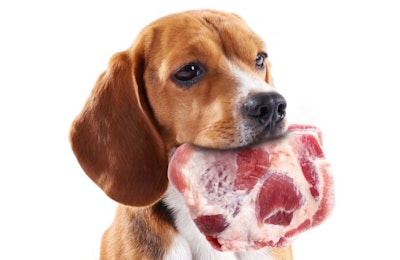
Despite pet food marketing messages and popular opinions that dogs should eat like wolves, dogs are naturally omnivorous, although they prefer meaty meals, wrote Linda Case in her blog, The Science Dog. That preference might not be instinctual though. Case provided empirical evidence for her assertion.
Dogs can digest carbohydrates because of biological differences from their wolf ancestors, she said. Specifically, dogs have more copies than wolves of the gene AMY2B, the gene that codes for pancreatic amylase, an enzyme that breaks down carbs into simpler sugar molecules.
However, dogs do seem to prefer foods with high meat content, even if that food only smells more like meat compared to a high-protein kibble. Case reviewed several studies conducted with feral dogs in India that provided evidence of dogs’ natural diet choices. These free-ranging dogs lived by scavenging human food waste, supplemented with occasional hunting of small animals.
Studies on feral dog preferences for meat
Scientific research supported the idea that dogs choose foods that smell like they contain more meat, as opposed to their actual protein content. In one study, published in Ethology, Ecology and Evolution, scientists conducted three experiments. In those experiments, the researchers presented thirty feral dogs with choices between:
- bread, bread soaked in water or bread soaked in chicken broth;
- bread, bread soaked in gravy or cooked chicken;
- dry dog kibble or bread soaked in varying concentrations of chicken broth
In the first experiment, dogs preferred the broth-soaked bread. In the second, cooked chicken was tops, followed by bread with gravy. The third experiment revealed something surprising, Case said. The dogs chose the brothy bread over the kibble, despite the kibble being higher in protein content. Apparently, the smell of the chicken broth was more important to the dogs’ decisions than the less odoriferous protein in the kibble.
In another study, published in Journal of Ethology, puppies didn’t show the same preference for meaty smelling foods. Instead the puppies ate the various options equally. The study’s authors suggested that this means dogs learn a preference for meaty, higher protein foods by observing their mothers and through experience.



















